Alcoholism and domestic abuse represent two of society’s most pressing issues, each with devastating consequences on individuals, families, and communities. According to the World Health Organization, globally, up to 55% of domestic abuse perpetrators were drinking alcohol prior to assault. Studies further indicate that alcohol misuse is implicated in 25-85% of reported domestic abuse cases, depending on the population and measurement method used. This variance underscores the complexity of the relationship between alcoholism and domestic violence, which can manifest differently across different contexts and demographics.
Alcohol does not directly cause domestic abuse but can exacerbate its frequency and severity by impairing judgment, reducing inhibition, and increasing aggression. It’s crucial to recognize that while alcohol can be a factor, abuse also occurs without it and not all who consume alcohol become abusive, indicating a complex interplay of additional factors like mental health and social norms.
Effective intervention requires addressing both alcoholism and domestic abuse simultaneously. Treatment programs that focus exclusively on substance abuse or violence in isolation may overlook critical aspects necessary for preventing recurrence. Integrated approaches that address both addiction and the dynamics of abuse provide more comprehensive support, better protecting victims, rehabilitating offenders, and reducing overall incidence.
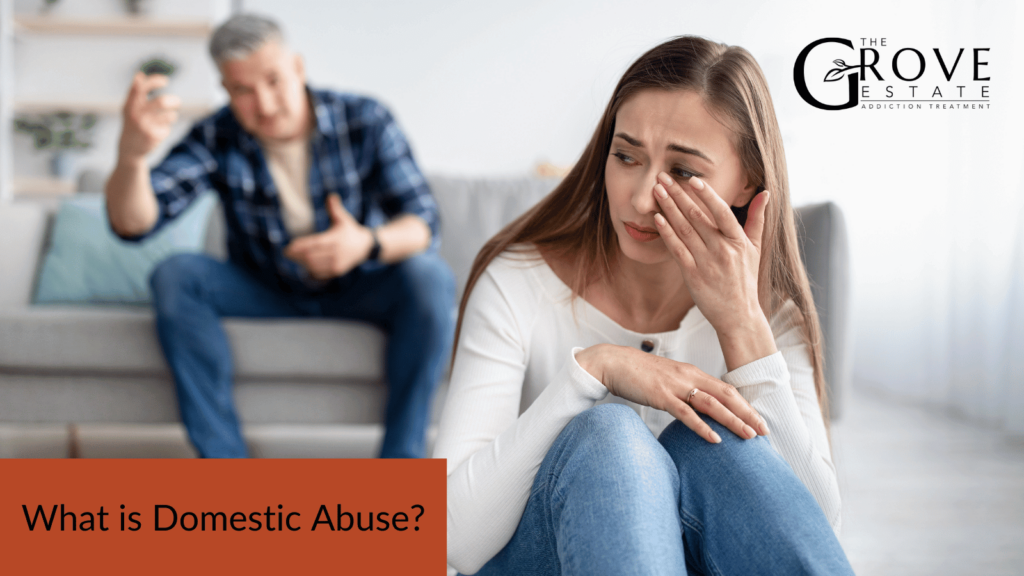
What is Domestic Abuse?
Domestic abuse, also known as domestic violence, refers to patterns of behavior in an intimate relationship that are used to maintain or gain power and control over an intimate partner. This abuse can take multiple forms. Physical abuse may involve hitting, slapping, shoving, and other physical acts, along with denying medical care or forcing substance use.
Emotional abuse includes undermining an individual’s self-worth through constant criticism, name-calling, or damaging their relationships with others. Psychological abuse can create a pervasive sense of fear through intimidation, threats of physical harm, destruction of property, and enforced isolation from family, friends, or work. Each type of abuse serves to manipulate and control the victim in different yet profoundly impactful ways.
What is The Impact of Alcohol on Domestic Abuse?
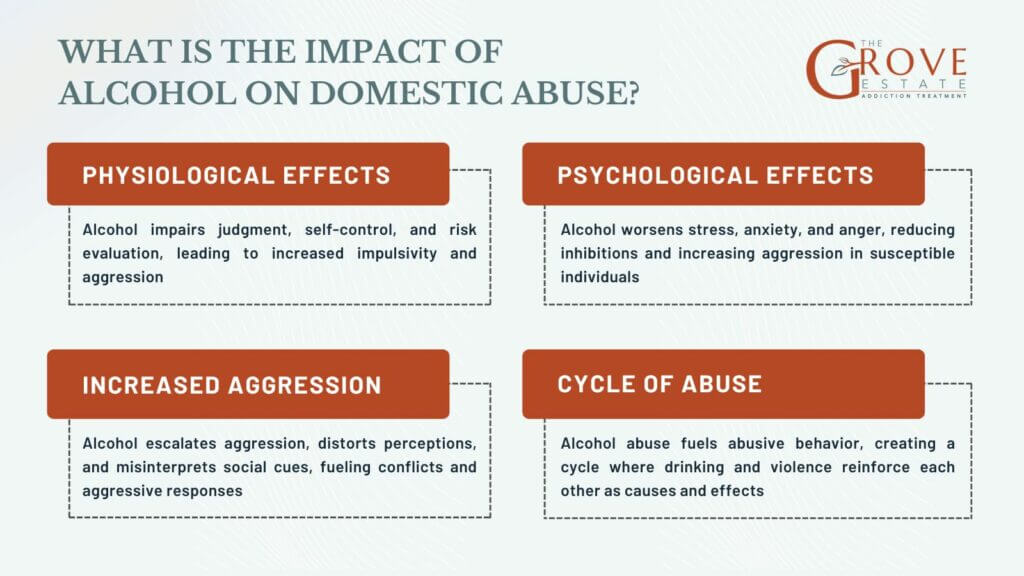
Alcohol often acts as a catalyst in abusive situations, amplifying existing tensions and reducing the inhibition of the abuser, making violent outbursts more likely. Here’s a detailed look at how alcohol impacts domestic abuse:
- Physiological Effects: Alcohol consumption affects the central nervous system, impairing brain functions like judgment, self-control, and the ability to evaluate risk. This impairment can lead to a decrease in an individual’s ability to control aggressive impulses. Alcohol can also increase impulsivity, making a person more likely to act without thinking through the consequences.
- Psychological Effects: Alcohol can exacerbate underlying emotional issues such as stress, anxiety, or anger. For individuals with a propensity towards aggression or those who have a history of violence, alcohol can lower the psychological barriers that normally restrain violent actions. The disinhibiting effect of alcohol means that an individual might express anger and aggression more readily than they would when sober.
- Increased Aggression: Alcohol increases aggression in individuals who are already prone to it. The intoxicating effects of alcohol can alter perceptions and lead to misinterpretation of social cues, potentially escalating conflicts. For instance, an intoxicated person might perceive a partner’s actions as more threatening or provocative than intended, leading to an aggressive response.
- Cycle of Abuse: Alcohol abuse can contribute to a cycle where abusive behavior is both a cause and a consequence of drinking. For example, an abuser might use alcohol as an excuse for their behavior, and the stressful aftermath of violent episodes might lead to further alcohol use as a coping mechanism.
Overall, while alcohol does not cause domestic abuse, it can significantly increase the likelihood and severity of its occurrence, making it a critical factor in many abusive relationships.
What are Some Key Alcohol and Domestic Abuse Statistics?
Here are some key statistics and findings from research that highlight the correlation between alcohol misuse and domestic abuse incidents, with sources specified for each data point:
- Prevalence in Domestic Abuse Cases: A study published in the Journal of Family Violence found that alcohol was reported in 50-60% of domestic abuse cases.
- Impact on Severity: Findings from the World Health Organization indicate that domestic violence incidents involving alcohol are more likely to result in severe injuries. Specifically, in cases where alcohol was a factor, injuries were reported in approximately 60% of incidents, as opposed to 49% in cases without alcohol involvement.
- Trends in Recidivism: Research by the American Journal of Public Health has demonstrated that alcohol misuse is associated with a higher rate of recidivism among domestic violence offenders. Offenders with alcohol-related problems are statistically more likely to reoffend compared to those without such issues
What are the Signs of Alcohol-Related Domestic Abuse?
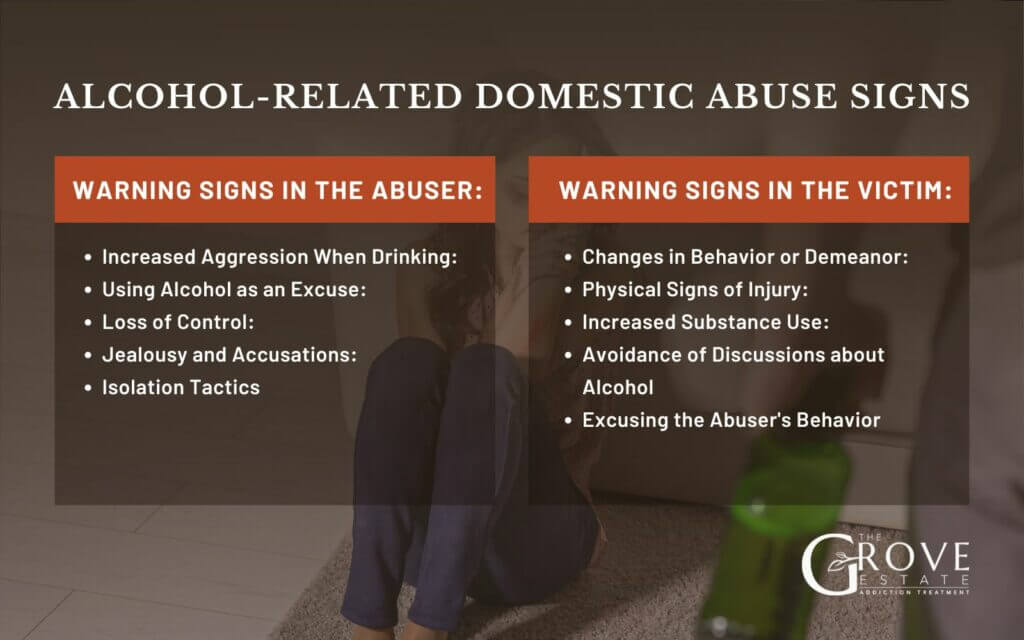
Identifying the warning signs of alcohol-related domestic abuse is crucial for early detection, prevention, and intervention. These signs can manifest in both the abuser and the victim. Here’s a breakdown of key indicators to watch for:
Warning Signs In the Abuser:
- Increased Aggression When Drinking: Noticeable increases in aggressiveness or anger when under the influence of alcohol, which may not be as pronounced when sober.
- Using Alcohol as an Excuse: The abuser might routinely blame alcohol for their violent or abusive behavior, using it as an excuse to justify their actions.
- Loss of Control: Exhibiting signs of losing control over their actions more frequently while drinking, such as unpredictable behavior or explosive outbursts.
- Jealousy and Accusations: Alcohol can exacerbate feelings of jealousy and paranoia, leading to accusations without basis and controlling behavior towards the partner.
- Isolation Tactics: Encouraging or forcing the victim to isolate from friends, family, or social networks, especially when these networks might intervene or discourage drinking.
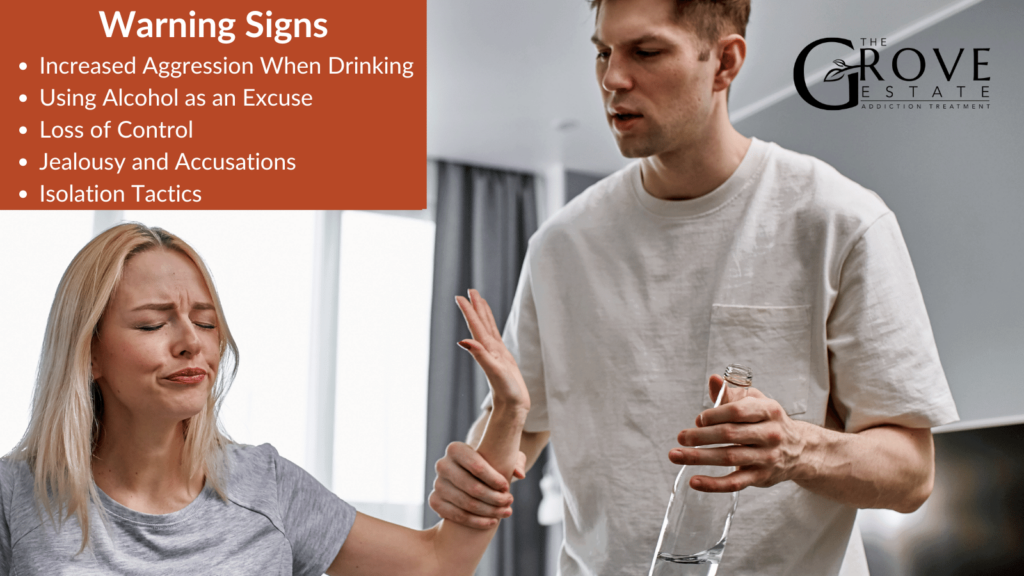
Warning Signs In the Victim:
- Changes in Behavior or Demeanor: Victims may appear more anxious, depressed, or withdrawn, particularly in social settings or when alcohol is present.
- Physical Signs of Injury: Unexplained bruises, marks, or injuries, especially recurrent ones, which they may try to explain away or hide.
- Increased Substance Use: Victims may begin using alcohol or drugs themselves as a coping mechanism to deal with the stress and trauma of the abuse.
- Avoidance of Discussions about Alcohol: They might avoid conversations about alcohol, the abuser’s drinking habits, or any related events that could trigger a violent response.
- Excusing the Abuser’s Behavior: Minimizing or rationalizing the abuser’s behavior, particularly when it relates to alcohol use, as a way to cope with the situation.
Awareness and recognition of these signs are vital for early intervention. Friends, family, and coworkers can play a critical role in recognizing these warning signs and offering support or resources. Additionally, healthcare providers and social workers trained in identifying these patterns can offer professional help and guide victims towards safety plans and support systems. Early intervention can prevent further harm and potentially save lives, making education and awareness key components in the fight against domestic abuse.
Why Does Alcohol Trigger Domestic Abuse?
Alcohol can trigger domestic abuse primarily due to its effects on the brain that impair judgment and lower inhibitions. Here’s a brief analysis of the underlying reasons:
- Lowered Inhibitions: Alcohol consumption reduces the brain’s ability to inhibit aggressive impulses. Normally, social norms and the potential consequences of actions serve as deterrents against violence. Alcohol blurs these boundaries, making it easier for an individual to act on harmful impulses.
- Impaired Judgment: Alcohol affects the frontal lobes of the brain, which are responsible for judgment and decision-making. Under the influence, individuals may misinterpret social cues or feel provoked by normal interactions, responding with disproportionate aggression.
- Increased Aggression: Research shows that alcohol can increase aggressive behavior by altering the levels of serotonin and other neurotransmitters in the brain. This biochemical change can predispose individuals to act violently.

How to Find Support for Abusers Seeking Change?
Individuals with alcoholism looking to address their abusive behavior should seek professional help to break the cycle of abuse. Engaging in professional counseling with therapists who specialize in domestic violence and substance abuse is crucial. These experts can assist in understanding the causes of abusive behavior and developing effective prevention strategies.
Additionally, participating in substance abuse programs, such as detox, rehabilitation, and support groups like Alcoholics Anonymous, is essential. Programs that integrate substance abuse treatment with anger management and domestic violence prevention can offer comprehensive support, emphasizing the importance of a structured approach to recovery and behavior change.
Legal Protection and Rights for Victims of Alcohol-Related Domestic Abuse
Victims of alcohol-related domestic abuse have various legal options and protective measures available to help ensure their safety and justice. Here’s a summary of these options:
- Restraining Orders: Victims can obtain restraining orders or protective orders, which legally forbid the abuser from contacting or coming near them. These orders can be critical in providing immediate safety and are enforceable by law enforcement.
- Criminal Charges: If the abuse involves physical assault or threats, criminal charges can be filed against the abuser. This can lead to arrest, prosecution, and, in cases of conviction, imprisonment or mandated treatment programs.
- Civil Suits: Victims may also consider filing a civil suit against the abuser for damages resulting from the abuse. This can include compensation for medical expenses, lost wages, and pain and suffering.
- Divorce Proceedings: In the context of a marriage, victims can file for divorce on grounds of cruelty or abuse. During these proceedings, they can also seek custody of children and financial support.
- Child Custody and Protection: Protecting children from exposure to domestic abuse is a priority. Courts can provide orders specific to the safety and welfare of children, including custody arrangements that protect them from the abuser.
Where Can I Find Support for Victims of Alcohol-Related Domestic Abuse?
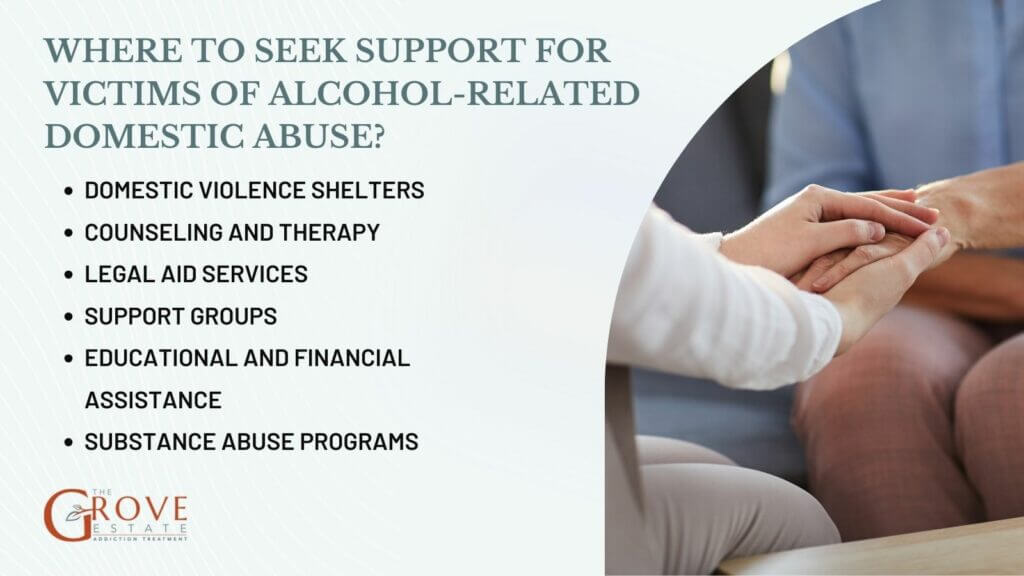
Victims of alcohol-related domestic abuse can access various forms of support to help them navigate their situations safely and recover from their experiences. Here’s an overview of the key types of support available:
- Domestic Violence Shelters: Many communities offer shelters specifically designed for victims of domestic abuse. These safe havens provide temporary housing, food, and security, along with other basic necessities. You can find them online, social service agencies or go to your local community law enforcement agency.
- Counseling and Therapy: Mental health support through counseling and therapy is crucial for victims. Therapists can help them process their experiences, deal with trauma, and build resilience. Both individual and group therapy sessions may be available.
- Legal Aid Services: Free or low-cost legal aid can be vital for victims who need to navigate the legal system. Legal professionals can help with obtaining restraining orders, filing for divorce, and pursuing custody of children.
- Support Groups: Support groups offer a space where victims can share their experiences and feelings with others who have faced similar situations. These groups provide peer support, reduce isolation, and help victims feel understood and supported. You can find these online, at local churches, shelters and community centers.
- Hotlines: Dedicated hotlines for domestic abuse victims are available 24/7, offering immediate advice, support, and information on local resources. The National Domestic Violence Hotline is 800-799-7233.
- Educational and Financial Assistance: Some organizations provide educational workshops on legal rights and how to navigate the legal system, as well as assistance with financial planning and job training to help victims gain independence.
- Substance Abuse Programs: If alcohol plays a role in the domestic situation, victims may benefit from substance abuse programs that provide education and support for dealing with a partner who abuses alcohol or if they themselves are struggling with substance use.
Each of these resources plays an important role in supporting victims, offering them a pathway to safety, empowerment, and recovery. Victims are encouraged to reach out to local resources to gain the support they need in addressing the complexities of alcohol-related domestic abuse.
What are the steps to take if I suspect someone I know is a victim of alcohol-related domestic abuse?
Approach the situation with care and support. Encourage them to seek help from local domestic violence organizations or hotlines. Offer to accompany them to counseling sessions or support group meetings. Educate yourself on the signs of domestic abuse and the resources available to provide informed guidance and assistance.
Can alcoholism treatment programs help address abusive behavior?
Yes, alcoholism treatment programs often incorporate counseling and therapy sessions that address underlying issues contributing to abusive behavior. These programs focus on promoting healthier coping mechanisms, anger management skills, and improving communication, which can lead to a reduction in abusive tendencies.
What role do support groups play in helping individuals affected by alcohol-related domestic abuse?
Support groups offer a safe space for individuals to share their experiences, gain emotional support, and learn from others facing similar challenges. They provide valuable insights, coping strategies, and a sense of community, which can be empowering and instrumental in the recovery process.
How do I find a domestic abuse shelter?
You can find domestic abuse shelters by contacting local domestic violence hotlines, organizations, or law enforcement agencies. They can provide information on nearby shelters, including their contact details and services offered. To find a domestic abuse shelter in the US, including Indiana, contact the National Domestic Violence Hotline at 1-800-799-SAFE (7233) or visit their website. You can also reach out to the Indiana Coalition Against Domestic Violence at 1-800-332-7385 or check online directories like DomesticShelters.org for local shelter information.
What are the signs of alcohol-related domestic abuse?
Signs of alcohol-related domestic abuse may include increased conflict and violence during or after drinking sessions. Victims may notice that their partner becomes more confrontational or aggressive when alcohol is involved. Physical signs of abuse, such as bruises or injuries, may also be more apparent following episodes of drinking. Additionally, abusers may use alcohol as an excuse for their violent behavior, claiming they were out of control due to intoxication.
It’s important for victims and their loved ones to recognize these signs and seek support. Resources such as binge drinking provide valuable information on how excessive alcohol consumption can lead to dangerous behaviors, including domestic abuse. Educating oneself about these connections can be a crucial step towards seeking help and preventing further harm.
Can alcohol addiction treatment help reduce domestic abuse?
Yes, treating alcohol addiction can significantly help reduce incidents of domestic abuse, particularly when alcohol is a major contributing factor to the abusive behavior. Treatment programs focus on helping individuals understand and manage their drinking habits, which can lead to a reduction in alcohol-related violence. Comprehensive addiction treatment often includes therapy sessions that address behavioral issues and provide strategies for managing anger and resolving conflicts more healthily.
For those involved in an abusive relationship where alcohol plays a role, accessing residential rehab can be a vital step. These programs offer a safe environment to recover from addiction while addressing the complex factors contributing to domestic abuse, facilitating a more stable and healthy relationship.

Share This Post



